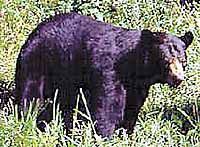| Current drought conditions in Utah have wildlife officials concerned that an increased number of black bears will frequent camping areas this summer. |
Utah wildlife officials are urging residents to keep a clean campsite and to not intentionally feed black bears in the state’s backcountry this summer.
“We’re noticing black bear problems earlier than normal this year,” advised Division of Wildlife Resources mammals corrdinator, Craig McLaughlin.
“We’ve already had several instances of black bears raiding summer homes and campgrounds in central Utah and killing sheep on rangelands. Bear problems have also been reported in northern, northeastern and southeastern Utah.”
“Five years of drought has reduced the vegetation, insect populations and berries that black bears eat in the summer,” continued McLaughlin. “So there’s a good chance more bears will be attracted to campgrounds in search of food, and that’s not good.”
Because black bears are wild animals, McLaughlin says they’re typically afraid of people.
“That changes as soon as they begin to associate people with a place to get food,” he warns. “They start losing their fear of people and can become aggressive and dangerous.”
McLaughlin explains that food is what attracts bears to people and that by following a few simple rules, visitors to Utah forests can virtually eliminate problems with bears.
The following tips may eliminate bear contact this summer.
•Keep the campsite clean. Don’t leave garbage, food scraps and fat drippings in a fire pit, or scattered around the campsite. Instead, place them in an air tight container and take them home.
•Keep the cooking grills and utensils in the area clean.
•Don’t leave food out. Instead, store food and coolers in the trunk of a car, in a camping trailer, in a bear proof container or suspended at least 12 feet high between two trees, so bears can’t reach it.
Plastic garbage cans and plastic food storage containers are not bear proof.
•Never intentionally feed bears by leaving food out for them.
•Bears have an incredible sense of smell, so make sure to cook away from the tent or sleeping area.
Also, don’t sleep in the clothes worn while cooking or while cleaning fish. Leave those clothes, along with utensils, rags and anything else used in food preparation, cooking, eating and clean up, at the cooking area or sealed inside a vehicle.
McLaughlin says when these tips aren’t followed, there aren’t many alternatives left.
“The first thing we’ll do with a bear that’s just gotten into trouble is haze it with rubber bullets or hounds or capture it in hopes that the experience will scare it enough that it won’t want to visit the campground again,” he explained.
“This only works with bears that are brand new to the campground, however. Bears that have already associated the campground with food will come back as soon as we move them.”
McLaughlin also says bears have an incredible homing ability and can find their way back to an area that’s as far as 100 miles away.
“It’s difficult for our regional wildlife managers to find remote sites to move problem bears to. As a result, often all we’ve done is shift the problem to a new area of the state,” McLaughlin pointed out. “The bear is used to looking to campgrounds for food, and it will roam and find a campground in the new area.”
McLaughlin aslo explains that it’s very simple to avoid putting a bear in a situation where it has to be killed to protect public safety.
“We hope people will follow our advice this summer,” he concluded.
Utah residents are urged to use caution this summer when participating in any outdoor activities in the state’s wilderness areas. Drought conditions can cause many wildlife species to act different and may put humans at risk.
Any questions regarding bear problems may be directed to any DWR office.

